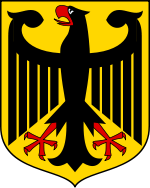Districts of Germany
| Germany |
 This article is part of the series: |
|
|
|
Constitution
Parliament
Judiciary
Executive
Divisions
Elections
Foreign policy
|
|
Other countries · Atlas |
German districts (Kreise or Landkreise in the states of North Rhine-Westphalia and Schleswig-Holstein, singular: Kreis and Landkreis; Kreis means 'circle') are administrative units used in Germany and the former state of Prussia. The districts are at an intermediate level of administration between the Länder (German states) and the local / municipal levels (Gemeinden). They are not to be confused with the larger Regierungsbezirk. Their equivalent in other nations is the county or arrondissement. They correspond to level 3 administrative units or Local Administrative Units under the Nomenclature of Territorial Units for Statistics.

Contents |
Types of districts
The majority of the districts are rural districts (Landkreise) of which there are 313. Cities with more than 100,000 inhabitants (and smaller towns in some states) do not usually belong to a district, but take over district responsibilities themselves, similar to the concept of independent cities. These are known as urban districts (Kreisfreie Städte / Stadtkreise)—cities which constitute a district in their own right—and there are currently (2007) 116 of them, bringing the total number of districts to 429.
In North Rhine-Westphalia, there are some cities with more than 100,000 inhabitants which are not urban districts, for example Iserlohn, Recklinghausen, Siegen, Paderborn, Bergisch Gladbach, Witten and Neuss. These cities, however, take over many district responsibilities themselves although belonging to a district. As an exception, the former rural and urban districts of Hanover in Lower Saxony were united in 2001 to form the new Region Hannover with about 1,000,000 inhabitants.
Responsibilities
The districts are responsible for the following:
- according to federal and regional laws:
- the building and upkeep of B roads
- other building plans which cover more than one local authority's area
- caring for national parks
- social welfare
- youth welfare
- the building and upkeep of hospitals
- the building and upkeep of state institutes of secondary education
- household waste collection and disposal
- car registration
- electing the Landrat or Landrätin, the chairperson of the district
- according to local laws: (differ in each region)
- financial support for culture
- the building of pedestrian zones and bicycle lanes
- financial support for school exchanges
- the building and upkeep of public libraries
- revitalisation of the economy
- encouraging tourism
- the management of Volkshochschulen (state run adult education colleges)
All these tasks are carried out by local (municipal) authorities operating together. Urban districts have these responsibilities and also those of the municipalities.
District council
The district council, the Kreistag, is the legislative body of the district and is responsible for local self-administration. The parliament is elected directly every five years, except in Bavaria where it is elected every six years.
District administration
The executive authority is an officer known as Landrat or Landrätin, who administers the district. In parts of northern Germany, this is also the name of the district administration, in southern Germany it is known as Kreisverwaltung.
See also
- Germany
- States of Germany
- List of German urban districts
- List of rural districts of Germany
- Wikipedia list with populations and area in sqkm (German)
- List of administrative divisions of Germany
|
||||||||